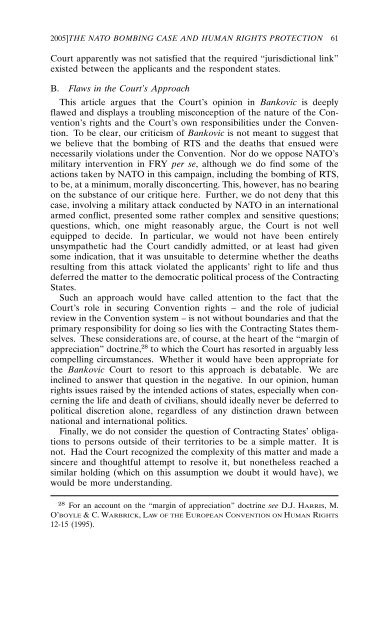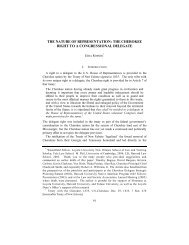THE NATO BOMBING CASE (BANKOVIC ET AL. V. BELGIUM ET AL ...
THE NATO BOMBING CASE (BANKOVIC ET AL. V. BELGIUM ET AL ...
THE NATO BOMBING CASE (BANKOVIC ET AL. V. BELGIUM ET AL ...
You also want an ePaper? Increase the reach of your titles
YUMPU automatically turns print PDFs into web optimized ePapers that Google loves.
2005]<strong>THE</strong> <strong>NATO</strong> <strong>BOMBING</strong> <strong>CASE</strong> AND HUMAN RIGHTS PROTECTION 61Court apparently was not satisfied that the required “jurisdictional link”existed between the applicants and the respondent states.B. Flaws in the Court’s ApproachThis article argues that the Court’s opinion in Bankovic is deeplyflawed and displays a troubling misconception of the nature of the Convention’srights and the Court’s own responsibilities under the Convention.To be clear, our criticism of Bankovic is not meant to suggest thatwe believe that the bombing of RTS and the deaths that ensued werenecessarily violations under the Convention. Nor do we oppose <strong>NATO</strong>’smilitary intervention in FRY per se, although we do find some of theactions taken by <strong>NATO</strong> in this campaign, including the bombing of RTS,to be, at a minimum, morally disconcerting. This, however, has no bearingon the substance of our critique here. Further, we do not deny that thiscase, involving a military attack conducted by <strong>NATO</strong> in an internationalarmed conflict, presented some rather complex and sensitive questions;questions, which, one might reasonably argue, the Court is not wellequipped to decide. In particular, we would not have been entirelyunsympathetic had the Court candidly admitted, or at least had givensome indication, that it was unsuitable to determine whether the deathsresulting from this attack violated the applicants’ right to life and thusdeferred the matter to the democratic political process of the ContractingStates.Such an approach would have called attention to the fact that theCourt’s role in securing Convention rights – and the role of judicialreview in the Convention system – is not without boundaries and that theprimary responsibility for doing so lies with the Contracting States themselves.These considerations are, of course, at the heart of the “margin ofappreciation” doctrine, 28 to which the Court has resorted in arguably lesscompelling circumstances. Whether it would have been appropriate forthe Bankovic Court to resort to this approach is debatable. We areinclined to answer that question in the negative. In our opinion, humanrights issues raised by the intended actions of states, especially when concerningthe life and death of civilians, should ideally never be deferred topolitical discretion alone, regardless of any distinction drawn betweennational and international politics.Finally, we do not consider the question of Contracting States’ obligationsto persons outside of their territories to be a simple matter. It isnot. Had the Court recognized the complexity of this matter and made asincere and thoughtful attempt to resolve it, but nonetheless reached asimilar holding (which on this assumption we doubt it would have), wewould be more understanding.28 For an account on the “margin of appreciation” doctrine see D.J. HARRIS, M.O’BOYLE & C. WARBRICK, LAW OF <strong>THE</strong> EUROPEAN CONVENTION ON HUMAN RIGHTS12-15 (1995).









